TWG Member Award: Difference between revisions
Jeffrey Kwang |
Hsu.leslie (talk | contribs) Add 2024 Spotlight awardees |
||
| Line 9: | Line 9: | ||
<br><br><br><center><div class="btn btn-lg btn-default lienbutton slideInBlock" type="button" style=" padding-top: 0.3cm;"> [https://docs.google.com/forms/d/e/1FAIpQLSfSHeojrxxGoRIAFtciO5heQJjTW61wtarLKajXd5SZKc0QZg/viewform Nominate a member]</div></center><br><br><br></div></div> | <br><br><br><center><div class="btn btn-lg btn-default lienbutton slideInBlock" type="button" style=" padding-top: 0.3cm;"> [https://docs.google.com/forms/d/e/1FAIpQLSfSHeojrxxGoRIAFtciO5heQJjTW61wtarLKajXd5SZKc0QZg/viewform Nominate a member]</div></center><br><br><br></div></div> | ||
<div class="row" style="background-color:#F5F5F5;"><br><div class="col-sm-9"> | <div class="row" style="background-color:#F5F5F5;"><br><div class="col-sm-9"> | ||
==Isamar Cortés== | |||
A 2024 Spotlight Award goes to '''Isamar Cortés''', PhD. candidate at Montclair State University!<br><br> | |||
[[File:cortes-isamar.jpg|thumb]] | |||
Isamar Cortés is a PhD candidate at Montclair State University, but her nomination and award are not for her doctoral work to understand mangrove-island response to climate and sea-level change, important as that is. Rather, her nomination was to highlight her work to enable and advocate for open-source computing. Isamar recently published [https://doi.org/10.1038/s43017-023-00401-4 "Open-source software for geospatial analysis" in Nature Reviews Earth & Environment]. Beyond this, she has poured effort into developing "Code to Communicate", a bilingual and freely available English–Spanish language introduction to scientific computing. | |||
Towards Isamar's goal of enabling bilingual science, her citation is provided here in Spanish. | |||
Al objetivo de Isamar de hacer una ciencia bilingüe, daré tambeń su citación en castellano. | |||
Isamar Cortés es candidata al doctorado aquí en Montclair State, pero su nominación y premio no son por su trabajo doctoral. A pesar de la importancia clara de comprender la respuesta de los manglares al cambio climático y del nivel del mar, su nominación es en realidad honrar su trabajo de la informática de código open-source. Isamar ha publicado recientemente "Open-source software for geospatial analysis" en Nature Reviews Earth & Environment. Además, se ha volcado en el desarrollo de "Code to Communicate", una introducción a la informática científica en inglés y castellano, bilingüe y de libre acceso. | |||
==Luke McGuire== | |||
A 2024 Spotlight Award goes to '''Dr. Luke McGuire''', Associate Professor of geomorphology at the University of Arizona!<br><br> | |||
[[File:McGuireL.jpg|thumb]] | |||
Luke McGuire combines his mathematical background with an intuition for water to develop blazingly fast models of hillslope hydrology and debris-flow processes. He uses these to better understand what happens in the aftermath of wildfires – an unfortunately prescient focus for the early 21st century. Luke does more than just model: he also collects the data against which to collect and improve his models, often hiking with heavy gear deep into the backcountry. This combination of on-the-ground experience and advancement in theory and computation is valuable in itself. But perhaps most importantly, Luke is known by colleagues and students for his generosity and patience in sharing his knowledge and time. | |||
==Jeffrey S. Kwang== | ==Jeffrey S. Kwang== | ||
| Line 21: | Line 43: | ||
Beyond his scientific achievements, Dr. Kwang mentors via Big Brothers, teaches computing through Girls Inc., and builds computers from old parts for people in need through Free Geek. | Beyond his scientific achievements, Dr. Kwang mentors via Big Brothers, teaches computing through Girls Inc., and builds computers from old parts for people in need through Free Geek. | ||
==Eric A. Barefoot== | ==Eric A. Barefoot== | ||
| Line 29: | Line 52: | ||
Eric's nominator writes:<br> | Eric's nominator writes:<br> | ||
''Eric has worked with a team, including Andrew Moodie and Jay Hariharan, to develop DeltaMetrics, a Python package for manipulating depositional system data cubes, which can be found in [https://github.com/DeltaRCM/DeltaMetrics this GitHub repo]. Eric's contribution is to extend the analysis tools for application on experimental data. Eric also showed outstanding enthusiasm and camaraderie during the 2020 Earth Surface Processes Institute. He was quick to answer questions from other participants and offer helpful advice. Finally, we would like to highlight his outreach work with AGU EPSP. He has helped lead a new initiative for students to network with scientists across diverse career paths. We are proud to have him in our community!'' | ''Eric has worked with a team, including Andrew Moodie and Jay Hariharan, to develop DeltaMetrics, a Python package for manipulating depositional system data cubes, which can be found in [https://github.com/DeltaRCM/DeltaMetrics this GitHub repo]. Eric's contribution is to extend the analysis tools for application on experimental data. Eric also showed outstanding enthusiasm and camaraderie during the 2020 Earth Surface Processes Institute. He was quick to answer questions from other participants and offer helpful advice. Finally, we would like to highlight his outreach work with AGU EPSP. He has helped lead a new initiative for students to network with scientists across diverse career paths. We are proud to have him in our community!'' | ||
==Katy Barnhart== | ==Katy Barnhart== | ||
| Line 36: | Line 60: | ||
''We acknowledge Katy for her work on Landlab, and specifically her contributions of terrainbento and umami, which can both be found here on [https://colorado.us15.list-manage.com/track/click?u=6244ee030fc53edb530ad5be4&id=ccd798e09c&e=54502886cd GitHub]. These two software packages can be used to build and compare the outcomes of different landscape evolution models. Katy is the lead author on a three-part series in JGR-Earth Surface which is essentially a how-to guide on parameter exploration, inter-model comparison, and using landscape evolution models to infer landscape shaping processes from landscape form (see [https://colorado.us15.list-manage.com/track/click?u=6244ee030fc53edb530ad5be4&id=81817b5355&e=54502886cd paper 1], [https://colorado.us15.list-manage.com/track/click?u=6244ee030fc53edb530ad5be4&id=f965e2180e&e=54502886cd paper 2], and [https://colorado.us15.list-manage.com/track/click?u=6244ee030fc53edb530ad5be4&id=c74124b387&e=54502886cd paper 3]). Katy is now a USGS Mendenhall Fellow working on post-fire debris flow processes.'' | ''We acknowledge Katy for her work on Landlab, and specifically her contributions of terrainbento and umami, which can both be found here on [https://colorado.us15.list-manage.com/track/click?u=6244ee030fc53edb530ad5be4&id=ccd798e09c&e=54502886cd GitHub]. These two software packages can be used to build and compare the outcomes of different landscape evolution models. Katy is the lead author on a three-part series in JGR-Earth Surface which is essentially a how-to guide on parameter exploration, inter-model comparison, and using landscape evolution models to infer landscape shaping processes from landscape form (see [https://colorado.us15.list-manage.com/track/click?u=6244ee030fc53edb530ad5be4&id=81817b5355&e=54502886cd paper 1], [https://colorado.us15.list-manage.com/track/click?u=6244ee030fc53edb530ad5be4&id=f965e2180e&e=54502886cd paper 2], and [https://colorado.us15.list-manage.com/track/click?u=6244ee030fc53edb530ad5be4&id=c74124b387&e=54502886cd paper 3]). Katy is now a USGS Mendenhall Fellow working on post-fire debris flow processes.'' | ||
==Brigid M. Lynch== | ==Brigid M. Lynch== | ||
Revision as of 11:44, 21 May 2024
Isamar Cortés
A 2024 Spotlight Award goes to Isamar Cortés, PhD. candidate at Montclair State University!

Isamar Cortés is a PhD candidate at Montclair State University, but her nomination and award are not for her doctoral work to understand mangrove-island response to climate and sea-level change, important as that is. Rather, her nomination was to highlight her work to enable and advocate for open-source computing. Isamar recently published "Open-source software for geospatial analysis" in Nature Reviews Earth & Environment. Beyond this, she has poured effort into developing "Code to Communicate", a bilingual and freely available English–Spanish language introduction to scientific computing.
Towards Isamar's goal of enabling bilingual science, her citation is provided here in Spanish.
Al objetivo de Isamar de hacer una ciencia bilingüe, daré tambeń su citación en castellano.
Isamar Cortés es candidata al doctorado aquí en Montclair State, pero su nominación y premio no son por su trabajo doctoral. A pesar de la importancia clara de comprender la respuesta de los manglares al cambio climático y del nivel del mar, su nominación es en realidad honrar su trabajo de la informática de código open-source. Isamar ha publicado recientemente "Open-source software for geospatial analysis" en Nature Reviews Earth & Environment. Además, se ha volcado en el desarrollo de "Code to Communicate", una introducción a la informática científica en inglés y castellano, bilingüe y de libre acceso.
Luke McGuire
A 2024 Spotlight Award goes to Dr. Luke McGuire, Associate Professor of geomorphology at the University of Arizona!
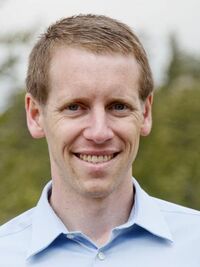
Luke McGuire combines his mathematical background with an intuition for water to develop blazingly fast models of hillslope hydrology and debris-flow processes. He uses these to better understand what happens in the aftermath of wildfires – an unfortunately prescient focus for the early 21st century. Luke does more than just model: he also collects the data against which to collect and improve his models, often hiking with heavy gear deep into the backcountry. This combination of on-the-ground experience and advancement in theory and computation is valuable in itself. But perhaps most importantly, Luke is known by colleagues and students for his generosity and patience in sharing his knowledge and time.
Jeffrey S. Kwang
The winner of the 2023 Spotlight Award is Dr. Jeffrey S. Kwang, NSF postdoctoral fellow at the University of Minnesota!
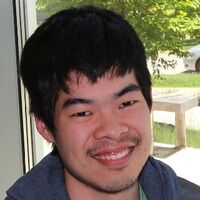
Jeffrey's nominator writes:
Dr. Jeffrey Kwang is the first author on a paper presenting the first model showing how drainage basins can completely reorganize themselves via lateral migration. He is also the first author of a recent paper modeling soil erosion and its effect on the balance of organic carbon. Presently, he is working with Prof. Andrew Wickert on a landscape evolution model to predict how drainage networks reorganize in landscapes that are covered in glacial till. Dr. Kwang is one of the very bright young stars working on the modeling of landscape evolution. He will be a major contributor to the CSDMS effort.
As part of our scientific community, Dr. Kwang developed the "TopoBlender" package, available on GitHub, for high-quality visualizations of both real and simulated landscapes.
Beyond his scientific achievements, Dr. Kwang mentors via Big Brothers, teaches computing through Girls Inc., and builds computers from old parts for people in need through Free Geek.
Eric A. Barefoot
The winner of the 2021 Spotlight Award is Dr. Eric A. Barefoot, recent Ph.D from Rice University!
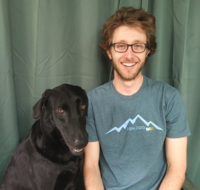
Eric's nominator writes:
Eric has worked with a team, including Andrew Moodie and Jay Hariharan, to develop DeltaMetrics, a Python package for manipulating depositional system data cubes, which can be found in this GitHub repo. Eric's contribution is to extend the analysis tools for application on experimental data. Eric also showed outstanding enthusiasm and camaraderie during the 2020 Earth Surface Processes Institute. He was quick to answer questions from other participants and offer helpful advice. Finally, we would like to highlight his outreach work with AGU EPSP. He has helped lead a new initiative for students to network with scientists across diverse career paths. We are proud to have him in our community!
Katy Barnhart
The winner of the 2020 Spotlight Award is Dr. Katherine (Katy) Barnhart, scientist at the U.S. Geological Survey!
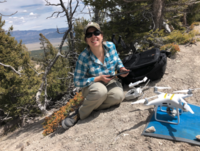
We acknowledge Katy for her work on Landlab, and specifically her contributions of terrainbento and umami, which can both be found here on GitHub. These two software packages can be used to build and compare the outcomes of different landscape evolution models. Katy is the lead author on a three-part series in JGR-Earth Surface which is essentially a how-to guide on parameter exploration, inter-model comparison, and using landscape evolution models to infer landscape shaping processes from landscape form (see paper 1, paper 2, and paper 3). Katy is now a USGS Mendenhall Fellow working on post-fire debris flow processes.
Brigid M. Lynch
The winner of the November 2018 Spotlight Award is also our first Terrestrial Working Group Member Spotlight winner, Brigid M. Lynch, graduate student at Indiana University!
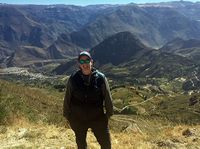
Brigid's nominator writes:
Brigid is coupling Landlab with WRF (Weather Research and Forecasting) and WRF-Hydro to explore the co-evolution of climate and landscapes. By using WRF, she is able to explicitly model the spatio-temporal patterns of precipitation during the growth of a mountain range. She is finding that the evolution of discharge distributions is latitude dependent, suggesting the feedbacks between mountain growth and orographic precipitation is spatially variable. Such modeling work will provide insight into data-focused exploration of the interaction of climate, tectonics, and topography.
Congratulations, Brigid!

